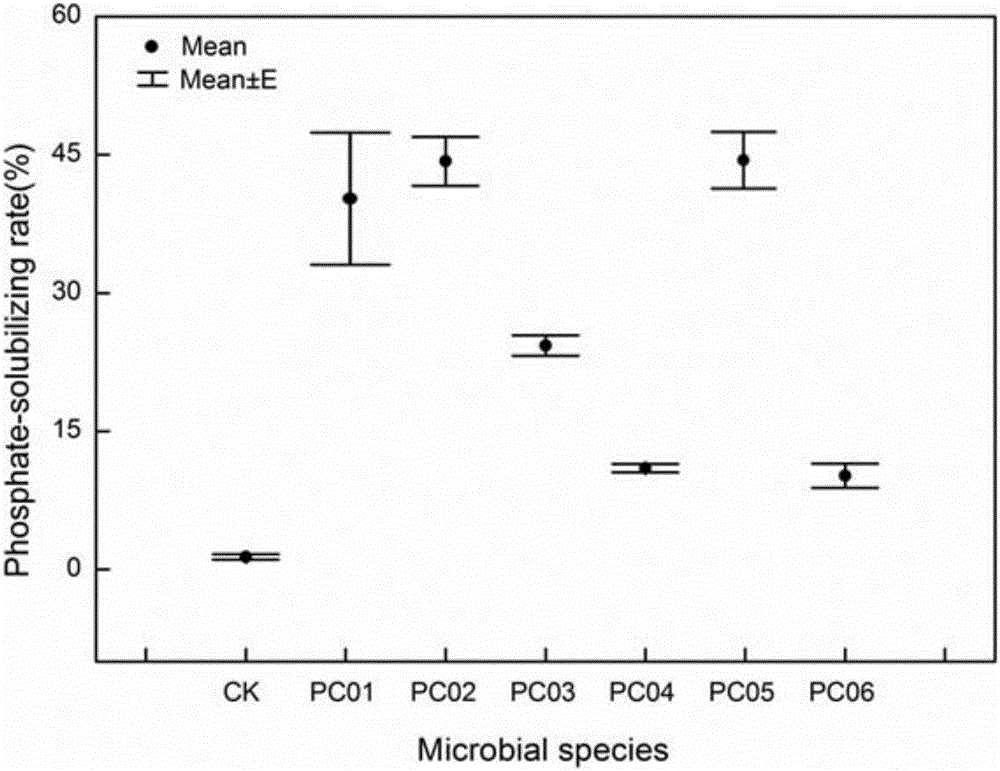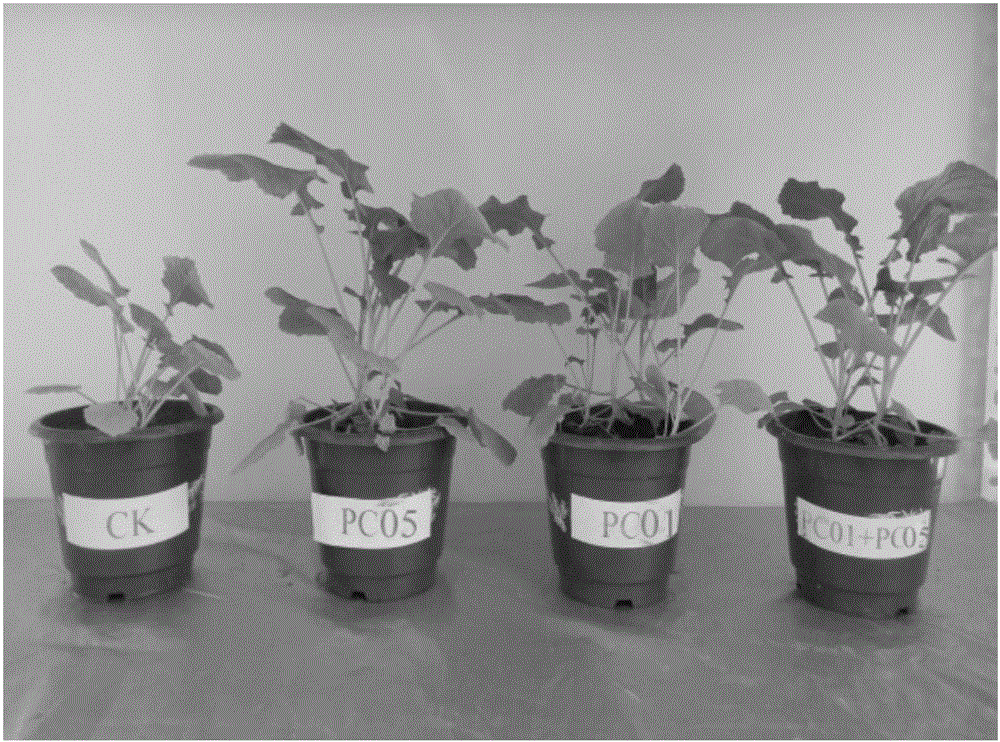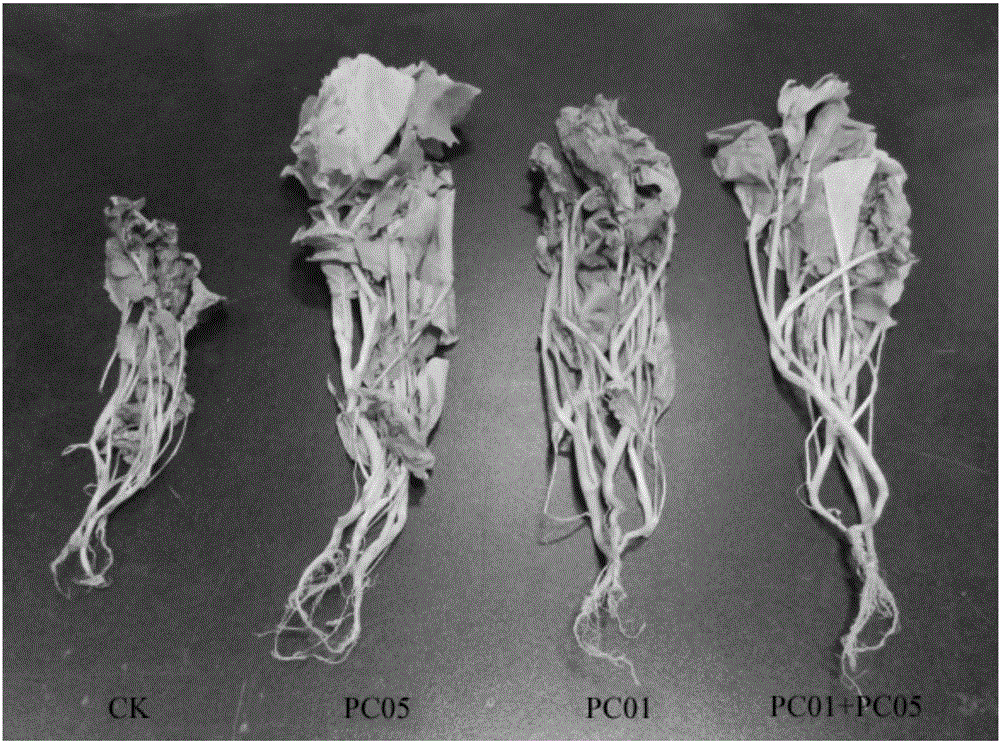Phosphate solubilizing bacteria PC05 and isolating and screening method thereof
A technology for separating, screening, and phosphate-solubilizing bacteria, applied in the field of agricultural microorganisms, can solve problems such as the inability of plants to directly absorb and utilize phosphate, uneven phosphate-solubilizing ability, and imbalance of nutrient elements, so as to reduce soil erosion, improve phosphate fertilizer utilization efficiency, and improve effective The effect of phosphorus content
- Summary
- Abstract
- Description
- Claims
- Application Information
AI Technical Summary
Problems solved by technology
Method used
Image
Examples
Embodiment 1
[0016] Preparation of inorganic phosphorus solid medium: by weight, the medium is composed of the following components: 10 g of glucose, (NH 4 ) 2 SO 4 0.5g, MgSO 4 ·H 2 O 0.3g, NaCl 0.3g, KCl 0.3g, FeSO 4 ·7H 2 O 0.03g, MnSO 4 ·H 2 O0.03g, Ca 3 (PO 4 ) 2 5g, agar 20g, distilled water 1000g; Ca 3 (PO 4 ) 2 After being sterilized separately from the rest of the ingredients, mixed, and adjusted to pH 7.0 to 7.2.
[0017] Take 10 mL of pig fecal liquid sample, put it into a 250 mL conical flask with glass beads, add 90 mL of sterile water, and shake at a constant temperature of 28 to 30 ° C for 30 to 45 minutes, so that the sample is evenly dispersed in the sterile water, and the dilution ratio is 10 -1 After the bacterial suspension was allowed to stand, the supernatant was taken and diluted in turn to obtain 10 -3 , 10 -5 , 10 -7 10 times the concentration gradient of the sample bacterial suspension, 10 -3 , 10 -5 , 10 -7 Take 0.1 mL of each bacterial susp...
Embodiment 2
[0022] Morphological observation and molecular identification of Phosphorus solubilizing bacteria PC05 isolated and screened in Example 1 were carried out. The growth physiology of Phosphorus solubilizing bacteria PC05 is that the colony surface is smooth, translucent, with neat edges, round and convex, and the Phosphorus solubilization circle is not obvious in the early stage of culture, but after 3 to 4 days, the Phosphorus solubilization circle is more obvious; the use of primers 27F and 1492R to strain PC05 Amplification and forward sequencing were performed to obtain a sequence length of 1445bp. By BLAST (Basic Search Tool for Local Sequence Alignment), the sequence was compared with the sequence in the GenBank database. Its similarity with NR_112560.1 exceeded 99%, and it was identified as Inquilinus ginsengisoli.
PUM
 Login to View More
Login to View More Abstract
Description
Claims
Application Information
 Login to View More
Login to View More - R&D
- Intellectual Property
- Life Sciences
- Materials
- Tech Scout
- Unparalleled Data Quality
- Higher Quality Content
- 60% Fewer Hallucinations
Browse by: Latest US Patents, China's latest patents, Technical Efficacy Thesaurus, Application Domain, Technology Topic, Popular Technical Reports.
© 2025 PatSnap. All rights reserved.Legal|Privacy policy|Modern Slavery Act Transparency Statement|Sitemap|About US| Contact US: help@patsnap.com



